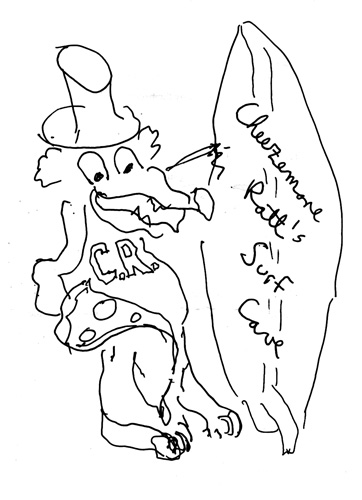
Surfers, skaters, snowboarders, bicyclists, break-dancers, rappers, and graffiti artists use “freestyle” to refer to unscripted and original moves that arise when a highly trained individual interacts with the physical world. Although “freestyle” has different nuances in each context, in every case, the emphasis is on allowing something gnarly, spontaneous, and fresh to emerge from a skillful interaction with the unpredictable flow of realtime events. High skill + reality-based unpredictability = freestyle.

When I talk about freestyle SF, I’m thinking of a science fiction that arises from intense and craftsmanlike use of classic science-fictional tropes to describe events happening in real and imaginary worlds.
I might characterize Freestyle SF by three qualities:
(1) The use of SF power-chords in an extreme and gnarly fashion.
(2) Carrying out thought experiments regardless of their practicality.
(3) Using a deft, light, and witty literary style.

Regarding point (1), when I speak of “SF power chords,” I mean those classic SF topes that have the visceral punch of heavy musical riffs: Blaster guns, spaceships, time machines, aliens, telepathy, flying saucers, warped space, faster-than-light travel, immersive virtual realities, clones, robots, teleportation, alien-controlled pod people, endless shrinking, the shattering of planet Earth, intelligent goo, antigravity, generation starships, ecodisaster, pleasure-center zappers, alternate universes, nanomachines, mind viruses, higher dimensions, a cosmic computation that generates our reality and, of course, the attack of the giant ants.

When a freestylist uses an SF power chord, he or she does something fresh with the trope, perhaps by juxtaposing it with an unfamiliar context, perhaps by describing it more intensely than usual, or perhaps by using it for a novel thought experiment. As mentioned before, skill is of the essence. Here I distinguish SF freestylists from less SFictionally committed writers who might merely be invoking SF power chords for atmospheric effect, without having the skill, or perhaps the will, to do something fresh.

In reference to point (2), thought experiments arise when a freestylist pushes the boundary of an SF trope or, unlikeliest of events, invents an entirely new power chord. The phrase comes from Albert Einstein, who fueled his science speculations with “Gedankenexperimenten.”

Thought experiments are a very powerful technique of philosophical investigation. In practice, it’s intractably difficult to visualize the side effects of new technological developments. In order to tease out the subtler consequences of current trends, a complex science-fictional simulation is necessary; inspired narration is a more powerful tool than logical analysis. If I want to imagine, for instance, what our world would be like if ordinary objects were conscious, then the best way to make progress is to fictionally simulate a person discovering this. Here again I make a distinction. Freestyle thought experiments are quite different in intent and in execution from merely futurological investigations. Freestylists aren’t interested in making useful predictions that businessmen can use. We don’t care about what might “really happen” in someone’s limited notion of the mundane world. The point is to see what could happen in an emotionally meaningful world of if.

In connection with the first two points, I’d like to quote from William Burroughs’s essay, “Remembering Jack Kerouac” (from The Adding Machine: Selected Essays, Seaver Books 1986):
“Many people who call themselves writers and have their names on books are not writers and they can’t write, like a bullfighter who makes passes with no bull there. The writer has been there or he can’t write about it. … [Writers] are trying to create a universe in which they have lived or where they would like to live. To write it, they must go there and submit to conditions that they might not have bargained for.”

The epitome of point (3) was Robert Sheckley. Over the years I got to spend a few golden hours in Sheckley’s presence, and I was saddened to hear of his death in December, 2005. Somewhat gallingly, Sheckley and I are often pigeonholed as “humorous SF writers”.
Our humor, such as it is, stems from uncovering incongruities or inconsistencies in our supposedly smooth-running society. You experience a release of tension when you notice a glitch. Something was off-kilter, and now you see what it was. The elephant in the living-room has been named. The evil spirit has been incanted. The inherent contradictions in our social conventions have become overt enough to provoke the shock of recognition and the concomitant release of laughter. But this essentially satirical process is quite different from the more parodistic and sophomoric kind of work that the “humorous SF” label suggests.

Sheckley puts it this way in his “Amsterdam Diary” (Rudy Rucker, Peter Lamborn Wilson, and Robert Anton Wilson, eds., Semiotext[e] SF, Autonomedia 1997):
“Good fiction is never preachy. It tells its truth only by inference and analogy. It uses the specific detail as its building block rather than the vague generalization. In my case it’s usually humorous — no mistaking my stuff for the Platform Talk of the 6th Patriarch. But I do not try to be funny, I merely write as I write … In the meantime I trust the voice I can never lose — my own … enjoying writing my story rather than looking forward to its completion.”









May 9th, 2006 at 8:57 am
Rudy, I’ve always found a slightly menacing edge to your stuff that I think is also present in Sheckley’s. The idea of either of you being a ‘humorous’ sf writer is kinda surreal.
Sorry, Charlie, we wanted sf writers who are humorous, not ‘humorous sf’ writers.
May 9th, 2006 at 3:19 pm
the other day i had a phone call inviting me 2 a party – when i was given the address i smiled 2 my innerselfdrain – because it was the address of The Martian Embassy where the SF is – all my Zappa Vinylations in the ESEMPLASM – anyway thanx fer the good vibrationZZZZ
love from KT
May 10th, 2006 at 9:29 am
Never forget the four-dimensional vistas of 42!!…. the ultimate answer to life, the universe and everything…. powerfull sci-fi “humor” on an astral sphere on a cosmic scale…. (refering to Douglas Adams of course)….
May 10th, 2006 at 5:00 pm
Rudy, your post made me think of this which I just ran across the other day.
interconnected.org/notes/2006/02/scifi/
May 10th, 2006 at 7:35 pm
Wait!! Stop!!…. In reference to the previous “linus” comment: Adam’s ultimate answer “42” is certainly MORE than continuing vistas of sheer absurdity…. to apprehend the true meaning of “42” (the ultimate answer to life, the universe and everything provided by the computer “Deep Thought”)…. we must first know what the QUESTION is!! The pan-galactic AI super-computer “Deep Thought” is trying to tell us that we do not even know what the QUESTION is, and if we DO ever know, will we necessarily UNDERSTAND what the QUESTION itself means in the first place?!!…. The appropriate consciousness of Proffessor Rucker’s devout literary following is therefore: to apprehend the philosophical “power-chord” meaning of Douglass Adam’s ultimate answer “42”, and certainly NOT to die laughing…. (besides, it’s unhealthy.)
May 11th, 2006 at 3:41 pm
I dislike Douglas Adams’s books. They are too silly and parodistic for my taste. I feel he never took SF seriously enough to really freestyle it or get anywhere interesting. But I will grant that THHGTTG was a pageturner, I read all however many vols in a week or so one summer.
May 11th, 2006 at 4:38 pm
the skateboard pack does not ajoinn the dog area &needer are open czech out NW5 2AU
on google urth wolfe gene
May 11th, 2006 at 9:22 pm
The late R. A. Lafferty was an SF writer with a fantastically strange sense of humor and with an extraordinary visionary imagination. He was also a beautiful stylist. He was one of the most unique writers in all of literature. Anyone else out there like him?
May 16th, 2006 at 12:15 pm
Ross – of course not, Lafferty was, as you say, an original. No one else would ever even think of approaching an idea from his angles. I always heard he drank heavily, and always assumed it was nightmares.
Rudy – I never really got Adams either. Funny, and yet depressing somehow. His characters are just irritating. On the other hand, I’ve had a big 42 stuck to my computer since it was a 386.
Linus – I do understand both the question AND the answer, but I don’t agree with them. Maybe it’s the notation. 64 seems more likely to me, or maybe 32.
May 16th, 2006 at 11:26 pm
*sobered by the warning under “add comment”*
How might I submit my (supposedly) humorous retro-SF story to your anthology? Have submissions already closed?
Shalanna, at comcast (a dot net production) (See, that one isn’t clickable)
May 17th, 2006 at 8:30 am
Shalanna, my story anthology with working title FREESTLYE SF is just a personal anthology of stories written or co-written by me, so, no I’m not accepting submissions! If I ever do edit a group anthology, it’s more likely it would be of mathematical or computer science stories.
May 18th, 2006 at 5:58 pm
Oh! Okay, will watch for it in the stores. And will start working on my mathematical/computer science stories and essays. “Once upon a time there was a series that just didn’t converge. No matter how hard she tried, at the last moment–POP, divergent.” *grin*
Thanks for the info.